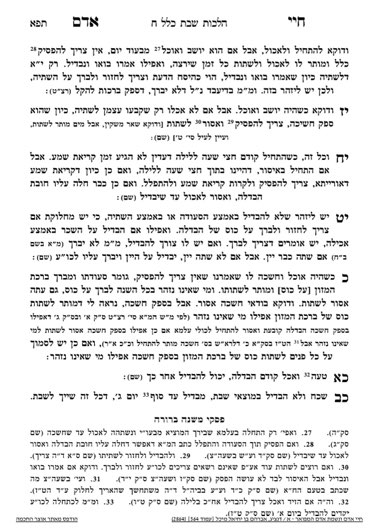We are beginning siman 18. Yesterday, we learned in our introduction to the siman about the issue of beginning a meal within a half hour of a mitzvah. Chazal imposed that a person should not begin a meal within 30 minutes before they will become obligated in a mitzvah, out of concern that one will be distracted by the meal and forget about the mitzvah. If one began more than a half hour before the mitzvah, they may continue and perform the mitzvah later. If one nevertheless began within 30 minutes, if it is a mitzvah deoraysa, they must stop and wait to perform the mitzvah, if it is derababan, they may continue and perform the mitzvah afterwards.
Regarding the definition of a meal, more than a k’beiah of bread is certainly a meal. Less than a k’beiah is certainly not considered a meal but considered a snack. Meat, fish, chicken or fruits are not considered a meal. Bread more than a k’beiah and pas habaah b’kisnin are the situations which are of concern.
Some poskim suggest that, nowadays, where we are much more likely to eat our meals without bread, maybe full meals of meat and the like should be problematic. However, the primary psak seems to be unlike this opinion, since Chazal did not include such a meal type in their issur.
As we have learned, this issue will not apply to motzei Shabbos, because the time between shkia and tzais hakochavim (when the chiyuv of kriyas shema takes effect) is more than 30 minutes.
To explain, as we learned yesterday, the Gemara gives us the amount of time it takes from shkia to tzais, and that time would seem to be about 14 minutes. Nevertheless, the Gra and Shulchan Aruch Harav point out that the Gemara is not discussing an amount of time inasmuch as an amount of darkness which that time engenders. As the sun goes below the horizon, the sky gets darker, and the amount of time it takes for the sun to go below the horizon will depend on location and season. For example, at the equator, the amount of time it takes for the sun to go below the horizon is very quick. As one goes further north or south, it takes longer and longer. The different times of the year will also make a difference, based on the angle of the earth towards the sun. The shortest amount of time it will takes will be at the equinox (although the time will be shorter at the spring equinox over the fall equinox), and the longest amount of time will be around the solstice (a little longer around the summer solstice and a little shorter around the winter solstice).
For example, in Silver Spring, using the calculation of 8.5 degrees below the horizon, it will take 40 minutes for the sun to set below the horizon during the fall equinox. It will take 49 minutes during the summer solstice, and about 46 minutes during the winter solstice. It will also take longer based on one’s latitude. Thus, when the Gemara gives the calculation of 14 minutes, it has to be extrapolated to the latitude, location and season of the person extrapolating. Getting back to our halacha, we say that one cannot begin a meal within a half hour of tzais hakochavim, it will not play out if they begin their meal before shkia, because the amount of time between shkia and tzais is more than 30 minutes.
It is possible that it would play out if a person is hungry, and uses the leeway of beginning their meal after shkia. Theoretically, if one began their meal after shkia, it could be possible that it would be within a half hour of tzais, but practically, it is not a concern for other reasons. Thus, although the concern does not apply practically to shalosh seudos, it is important to be aware of the concept.
Summary
- One cannot begin a meal within 30 minutes of when they will be obligated in a mitzvah.
- In calculating tzais hakochavim, we calculate an amount of darkness in the sky, and the amount of time it will take to reach this darkness will depend on location, latitude, and season.



